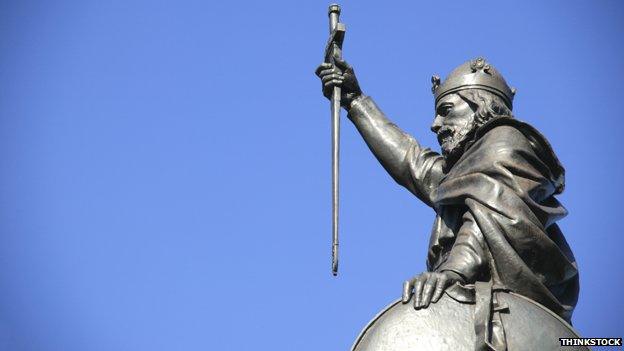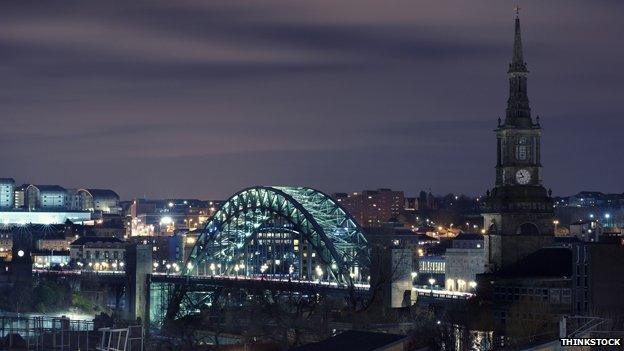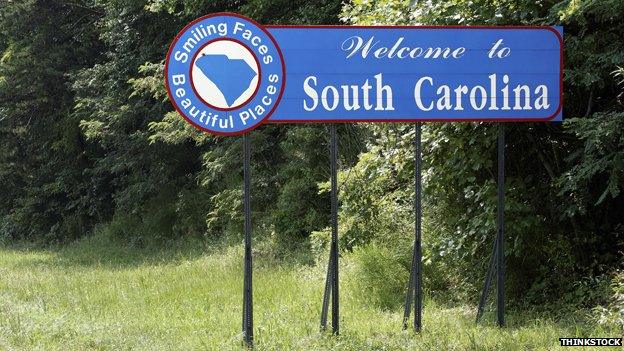A Point of View: Taking England back to the Dark Ages
- Published

What would happen if England started to break up into its seven Anglo-Saxon kingdoms? Tom Shakespeare lets his imagination run riot.
Thirty years ago this autumn, I began a degree in Anglo-Saxon, Norse and Celtic at Cambridge University. We ASNaCs, as we were known, were a happy band, who understood that Vikings had no horns on their helmets, who yearned to yomp across Iceland, and who venerated Bede above all the saints. In more recent times, I've often been reminded of those student days by the debates over Scottish independence, not least because I love to point out to SNP stalwarts that Edinburgh started out as Edwin's burgh, founded by Edwin, King of Northumbria. It never seems to go down well.
Anyway, bear with me, because a serious point is going to emerge from these memories of the mead hall. You see, for me, the issue of Scottish independence is not about what happens to what might become "the nation again" of Scotland, but about how those of us who are left behind, manage to cope in our new disunited kingdom.
Scotland would end up a nice size, about five and a quarter million people. As Mr Salmond wishfully dreams, that's about the same population as those prosperous egalitarian Nordic countries across the North Sea which once ravaged our shores with swords and axes, rather than sombre detective stories and traditional knit pullovers.
Meanwhile, setting Wales aside, England would be left with a cumbersome 53 million plus. Which represents a bit of a problem.
Because size does matter. It seems to me that progressive, reasonable, pacific and prosperous states - like the Nordic countries, or Switzerland or New Zealand - tend to be less than 10 million people. That's almost intimate, for a nation. Citizens of smaller countries feel pride and connection. The population is small enough to have deliberative public policy, which takes account of local needs. The health service and the education service seem less distant from everyday lives. Folk feel more involved and valued. I can imagine how Scotland might achieve that, with only five million. But what about the rest of us?
Here's where those years of studying Anglo-Saxon history come in. Before Alfred the Great unified the English in resistance to the Danes, England was not one country. Between about 500 and 850 AD, it was a heptarchy, meaning seven kingdoms, although in truth the number tended to fluctuate. If memory serves, the leading members of the heptarchy comprised Northumbria, Wessex, Mercia, and East Anglia. The others were Sussex, Kent and Essex, although there was quite a bit of boundary change happening for the three centuries or so that this era lasted - all very much Game of Thrones.

Alfred the Great united the English in resistance to the Danes
What happens if we put away again the swords and spears, and think in terms of England as heptarchy? Divide 50 million by seven, and you would get a neat set of seven countries, each at seven million souls. Wessex gets the West country and Bristol and the Thames Valley and the South Coast. Cornwall has just been recognised as a distinct region, and this way the whole South West gets to control its own destiny.
Mercia would be the Midlands and up as far as Manchester, home of manufacturing, with heavy metal and indie music as important exports. Northumbria has the rest of the North. East Anglia could take over Leicestershire, Lincolnshire and Cambridgeshire as well as Norfolk, Suffolk and Essex. That leaves Kent and Sussex to fight over the South East, with London as a new statelet on its own. I haven't done the maths yet, but I imagine you could do something neat to balance it all out. So then you would have Scotland, Wales and seven English territories on the island of Britain, all of approximately the same scale, and all with a chance of building a sense of identity for themselves. It's no coincidence, that these statelets would be about the same size as the average American state or a Nordic country.
There would be plenty of advantages. Rationalisation of the 30 or so British police forces is long overdue, and this way there would be seven obvious territories for separate police forces. Sport would become very interesting, as the seven home nations battled it out with each other, and with Wales, Scotland and Northern Ireland at cricket and rugby and football. The new dispensation would suit the traditionalists, because it would be rooted in a history going back to the Dark Ages, and it would suit progressive types, because it's all about devolution and bringing power closer to the citizen.

Newcastle - "Northumbrians already fly their flag with pride"
For most of my adult life, I have lived in regions that were proud of their identity, and keen to throw off the shackles of central government. Twenty years ago, I moved up to Newcastle, and in my experience, most Geordies are itching for their bit of home rule. Northumbrians already fly their flag with pride. After that, I lived for five years in Switzerland, which has been a confederation of small independent republics since the medieval period. Geneva and the other 25 cantons all rule themselves very happily, with a strong sense of local pride and distinctiveness. And now I live in Norwich, where Norfolk patriotism has a rural fervour of its own. So all this makes perfect sense to me.
Each of these new seven states, together with the other countries of the Disunited Kingdom, could set its own policies. People could decide which type of regime they wanted to be a citizen of, and move house to somewhere they felt they belonged. These new states would compete with each other economically, as well as in terms of sports and culture, and this competition would drive up standards for everyone. Forget the Dark Ages, it could be a new Golden Age, thanks to the re-thinking which Scottish independence would surely force on the rest of us who were left behind.
Of course, there would be disadvantages too, as I realized when a North American friend pointed out to me that my plan was reminiscent of the debate about state rights that often dominates US politics. The 50 US states average about five million citizens each, and they can often be resentful not just of federal dominance, but also of their neighbours. South Carolina once squabbled with Georgia about who could call itself the "peach state". As water becomes scarce, states argue about who is entitled to run hydro-electric or irrigation schemes on shared rivers. States have often tried to uphold more conservative legislation than the federal government, for example with regard to racial equality, gun control or more recently gay marriage.

Then I remembered that another drawback of localism might be nimby-ism (Not In My Back Yard). When citizens think at the level of their immediate community, they fail to see the common interest that they share with others in their wider society, so they reject that hostel for recovering drug addicts. They tend to be more short term than long term in their analysis, so they reject those wind turbines. They can end up being selfish and defensive and competitive with others. After all, the word parochial literally means "relating to a parish" but it has become a synonym for having a narrow outlook. I am not sure that it's just a coincidence that Switzerland is one of the more reactionary and anti-immigrant nations in Europe.
My view is that we need fewer borders, not more. That's why the European Union makes sense to me. I worry that if we were to go back to historical precedent for the basis of our political units, we would end up fighting medieval battles, not with bows and arrows, but with immigration rules and tax regimes. In the 21st Century, surely it's time to celebrate what unites us, not what divides us. If we are ever to overcome the problem of climate change, we think globally and act globally. I do love the idea of bringing back the heptarchy, both because I think smaller countries work better, but also because I love traditions. But, proud as I am to be an East Anglian, I think I am first and foremost a human being.
A Point of View is broadcast on Friday on Radio 4 at 20:50 BST and repeated on Sunday at 08:50 BST. Catch up on BBC iPlayer
Subscribe to the BBC News Magazine's email newsletter to get articles sent to your inbox.